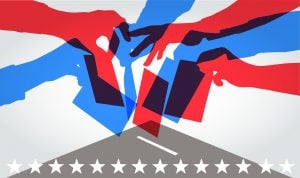Yesterday,
the
16
cosplay
Trump
2020
electors
from
Michigan
got
a
nasty
surprise
in
the
form
of
an
eight-count
indictment
charging
them
with
forgery,
uttering
or
publishing
a
false,
forged,
or
counterfeit
record,
conspiracy,
and
election
crimes.
Because,
as
so
many
Trump-era
figures
have
discovered,
f-in’
around
is
fun,
but
finding
out’s
a
bitch.
The
indictees
are
all
old
enough
to
know
better,
with
the
youngest
clocking
in
at
a
sprightly
55.
Worse
still,
their
ranks
include
state
Republican
party
officials,
a
mayor,
a
school
board
official,
and
a
town
clerk.
Nevertheless,
when
the
Trump
campaign
asked
them
to
disregard
President
Biden’s
154,000
vote
victory
margin,
even
after
it
was
confirmed
by
multiple
recounts,
they
rushed
to
comply.
(It’s
perhaps
less
surprising
that
the
certificate
was
signed
by
Timothy
King,
the
named
plaintiff
in
King
v.
Whitmer,
the
disastrous
Kraken
lawsuit
that
got
Sidney
Powell
and
the
legal
derp
squad
sanctioned.)
Here
they
are
unsuccessfully
attempting
to
convince
a
security
guard
to
let
them
into
the
state
Capitol
so
they
can
sign
their
fake
electoral
certificate
on
December
14,
2020.
Their
prior
plan,
which
was
also
thwarted,
had
been
to
sleep
in
the
building
overnight.
As
Just
Security’s
Ryan
Goodman
points
out,
that’s
because
Michigan
law
specifies
that
the
electors
“shall
convene
in
the
senate
chamber
at
the
capitol
of
the
state
at
2
p.m.,
eastern
standard
time,
on
the
first
Monday
after
the
second
Wednesday
in
December
following
their
election.”
Indeed,
New
York
lawyer
Kenneth
Chesebro,
one
of
John
Eastman’s
confederates,
observed
that
“Michigan
is
much
more
specific
about
the
location
in
which
electors
must
meet,
which
could
be
a
bit
awkward,”
in
a
December
9,
2020
memo
entitled
“Statutory
Requirements
for
December
14
Electoral
Votes.”
After
getting
turned
away
at
the
Capitol,
the
electors
met
in
the
basement
of
the
RNC
headquarters
and
signed
their
names
on
the
fake
certificate,
attesting
not
only
that
they
were
the
official
electors,
but
that
“we
convened
and
organized
in
the
State
Capitol,
in
the
City
of
Lansing,
Michigan,
and
at
2:00
p.m.
Eastern
Standard
Time
on
the
14th
day
of
December,
2020,
performed
the
duties
enjoined
upon
us.”
“That
was
a
lie.
They
weren’t
the
duly
elected
and
qualified
electors,
and
each
of
the
defendants
knew
it,”
State
Attorney
General
Dana
Nessel
said
yesterday
in
a
videotaped
statement
announcing
the
charges.
“They
carried
out
these
actions
with
the
hope
and
belief
that
the
electoral
votes
of
Michigan’s
2020
election
would
be
awarded
to
the
candidate
of
their
choosing,
instead
of
the
candidate
that
Michigan
voters
actually
chose.”
Nessel
also
took
time
to
differentiate
this
case
from
the
oft-cited
1960
electoral
certification
in
Hawaii,
when
there
were
ongoing
recounts
and
litigation,
necessitating
two
slates
of
electors
being
sworn
in:
one
for
Kennedy,
one
for
Nixon.
No
state
or
federal
court
had
provided
credence
to
even
a
single
claim
that
could
have
impugned
the
authority
of
the
rightful
slate
of
Biden
electors.
The
United
States
Supreme
Court
itself,
the
highest
court
in
all
of
America,
had
issued
an
order
3
days
earlier
declining
to
hear
a
challenge
to
the
certification
of
Michigan’s
presidential
election.
There
remained
no
question
of
the
outcome
of
this
election
and
no
reason
to
necessitate
the
creation
of
a
back-up
slate
of
electors,
other
than
to
unlawfully
overturn
the
election.
That
the
effort
failed,
and
democracy
prevailed
does
not
erase
the
crimes
of
those
who
enacted
the
False
Electors
plot
to
overturn
the
election
and
circumvent
the
will
of
Michigan
voters.
Former
state
GOP
chair
Meshawn
Maddock
remained
defiant,
calling
the
charges
“political
persecution”
and
telling
NBC
“The
democrats
know
they
can’t
beat
Trump
in
24
so
they
have
to
use
lawfare
to
try
to
imprison
their
opponents.”
She
also called
Transportation
Secretary
Pete
Buttigieg
a
“weak
little
girl,”
so
…
consider
the
source.
In
the
meantime,
the
states
appear
to
have
run
out
of
patience
waiting
for
Merrick
Garland.
Nessel
referred
the
electors
case
to
the
Justice
Department
in
2021,
but
resumed
her
investigation
in
2022
when
the
DOJ
appeared
to
ignore
it.
In
Georgia,
Fulton
County
District
Attorney
Fani
Willis
has
sent
target
letters
to
multiple
signatories
to
her
state’s
fake
electoral
certificate.
And
in
Arizona,
Attorney
General
Kris
Mayes
has
announced
that
she
is
looking
into
that
state’s
fraudulent
electoral
certificate
as
well.
Liz
Dye lives
in
Baltimore
where
she
writes
about
law
and
politics
and
appears
on
the Opening
Arguments podcast.











 Jordan
Jordan
 Chris
Chris
 Kathryn
Kathryn



